- Home
- Alex Archer
Destiny
Destiny Read online
ROGUE Angel
Alex Archer
DESTINY
TORONTO • NEW YORK • LONDON
AMSTERDAM • PARIS • SYDNEY • HAMBURG
STOCKHOLM • ATHENS • TOKYO • MILAN
MADRID • WARSAW • BUDAPEST • AUCKLAND
Contents
Prologue
Chapter 1
Chapter 2
Chapter 3
Chapter 4
Chapter 5
Chapter 6
Chapter 7
Chapter 8
Chapter 9
Chapter 10
Chapter 11
Chapter 12
Chapter 13
Chapter 14
Chapter 15
Chapter 16
Chapter 17
Chapter 18
Chapter 19
Chapter 20
Chapter 21
Chapter 22
Chapter 23
Chapter 24
Chapter 25
Chapter 26
Chapter 27
Chapter 28
Chapter 29
Chapter 30
Chapter 31
Epilogue
Coming Next Month
Prologue
Rouen, France
30 May 1431
Out of breath, feeling as though the hounds of Hell pursued him, Roux whipped his horse mercilessly. The beast barely kept its feet on the muddy road. Bloody slaver covered its muzzle, streaking its neck and chest.
Straw-thatched houses lined the road, interrupted by the occasional stone building. He guided the horse between them, yanking the bridle hard and causing the animal to stumble.
“They’re going to kill her,” Durand Lassois had reported only a few days earlier. The big warrior had tears running down his scarred face and trickling through his black beard. “It’s the damned English, Roux. They’re trying her as a heretic. They’re going to convict her and burn her at the stake. There’s nothing we can do.”
Roux hadn’t believed it. The girl was marked for important things. She was a guardian of innocents, a true power to be reckoned with in the mortal world. The English were greedy bastards and fools besides.
He still didn’t believe the girl would be killed now. He’d sensed the strength within her. Seventeen years old and she’d led men into battle at the besieged city of Orléans two years ago.
That had been the beginning of a string of victories that had lifted the English yoke from French necks. Her efforts, her conviction and her leadership brought the crown to the dauphin and allowed him to be crowned Charles VII.
Hypnotized by the power and a chance to negotiate peace, the new king had failed to act quickly and lost the tide of the war. The girl had been wounded during the attack on Paris. The French army never regained its momentum. She was captured during the attempt to lift the siege at Compiegne in May of last year. For the ensuing twelve months, the English at Rouen had held her.
Another half-dozen turns and traffic choked the roads leading to the market. Oxen-pulled carts, horses and asses stood in disarray. French peasants who had buried their hatred of the English in fear for their lives and armored English soldiers who pursued French maidens shared the road.
Roux jerked the reins and brought his horse to a stop. The flashing hooves threw mud over bystanders as the exhausted animal sagged to its rear haunches. Roux vaulted from the horse and landed in the mud.
Garin brought his mount to a similar sliding halt inches shy of colliding with Roux. The younger man’s dismount was not nearly so elegant. His foot caught in a stirrup and he tumbled into the mud. When he rose, he was covered. He cursed in German as he tried to brush the muck from him.
Four inches over six feet in height, Roux’s apprentice drew immediate attention because of his size. His straight black hair hung to his broad shoulders. Handsome features and his square-cut jaw, devoid of a beard because he was vain about his looks, drew a second glance from every female in the crowd. Magnetic black eyes held challenge and ferocity.
Gathering his riding cloak about him, Roux strode through the crowd. Grudgingly, people parted before him. He carried himself like a lord, though he was no such thing.
He looked like an old man, with white hair and a white goatee. His skin was fair, red from the sun and the wind during the long ride. Though not of the best quality, his clothing—pants, blouse and knee-high boots—showed signs of being well kept. At his side, he carried a saber with a worn handle.
Garin trailed Roux, swaggering through the crowd. He wore a long broadsword scabbarded down his back so the hilt jutted up over his right shoulder.
Only a moment later, Roux stood at the front of the crowd.
The English had tied the maiden to a pillar in the marketplace. She stood atop a pile of wood and more logs were piled up to her calves. Her executioner had also outfitted her with faggots, small bundles of sticks and straw that were tied to her calves, thighs, hands, torso and hair.
Her death was intended to be cruel and painful.
Sickness twisted Roux’s stomach. Steeling himself, he watched with grim expectation.
She will not burn, he told himself. She will not die.
This is not her destiny.
Still, for all that was in him to believe, he doubted. The young woman had always been stronger in her convictions. Her faith was one of the things that had drawn him to her. That, and the raw, unbridled power that clung to her. Roux had never been able to withstand the pull of that force.
As she faced death, clad in the same male clothing she’d worn so proudly in battle, she stood solemn and unshaken.
She didn’t come here to die, Roux told himself. She’s going to be all right.
“We can’t just stand here and let them kill her,” Garin said softly at his side.
“What do you propose, apprentice?” Roux demanded. “Should we rush in, you and I, and slay all the English warriors and free her?”
“No. We can’t do that. They would only kill us.” Garin’s answer was immediate.
Pierre Cauchon, the presiding judge, stepped forward and read out the charges. Stern and dogmatic, he accused the warrior maiden of heresy and of being opposed to the church. He went on to add that she was a bloodthirsty killer and demon possessed besides. No mention was made of his own part in the bloody Cabochien Revolt in 1413 or his defense of the assassination of the duke of Orléans in 1407.
At the bailiff’s command, soldiers lit fires along the pyre. Flames eagerly leaped up and twisted through the jumble of wood. The stench of smoke filled the air.
The young woman cried out, but not for help. She asked only that her friends hold up a crucifix so that she could look upon it. Two men did. In a strong, brave voice, the maid prayed to her Savior, asking for the aid of the saints.
You can’t just let her die, Roux thought. Not like this. She’s meant for more than this. His promise to her and to himself haunted him.
Unable to stand anymore, Roux surged forward. “Enough!” he cried, and he put all the long years of command he’d learned into his voice.
Heads turned in his direction. Several townspeople drew back from him fearfully as the English soldiers converged on him with drawn swords and maces.
Roux drew his saber with a rasp of metal. “Set her free!” he thundered. “By God, you’ll set her free or you’ll know the fiery pits of Hell yourselves for judging her so harshly!”
Before he could take another step, something crashed into the back of Roux’s skull. The English soldiers took away his saber and kicked him dozens of times, breaking his ribs and the fingers of his right hand. They stopped short of killing him.
While Roux was being beaten, the English commander took the maiden warrior’s famed sword and raised it high. The broad
sword, plain and unadorned, gleamed in the firelight. He put the tip against the ground and his foot at the center of the blade.
The broadsword shattered, falling into fragments in the mud.
Peasant and soldier pushed forward and snatched the shards from the trampled mud. The commander tossed the hilt deep into the crowd.
Smoke obscured almost everything by then, but Roux still saw her. She continued praying until the end, until finally the flames climbed her body and she sagged against the restraints.
Roux wept, barely hanging on to consciousness.
“Did you see it?” an English soldier shouted suddenly. The frantic note in his voice drew the attention of his comrades away from Roux. “Did you see the dove? A white dove left her body at the moment she died!”
Consternation filled the crowd. They drew back from the blazing pyre. The French separated from the English. In that moment, Roux couldn’t hold on any longer. He sunk into familiar inky blackness.
1
Lozère, France
Present Day
She was being followed.
Annja Creed knew that from experience. She’d been followed before. Stalked, actually. On two occasions—once in Venice and once outside Berlin—the experience had ended in violence.
“Wait,” Annja told her young guide.
Avery Moreau, seventeen years old and French, his hair a thick black shock and his demeanor sulky, stopped. Thin and lanky, dressed in his American jeans, red pullover and gray Nike hoodie, he didn’t look as if he’d be particularly helpful in a physical encounter.
“What’s wrong?” he asked.
“I want to look at this.” Annja stood in front of the shop window and gazed with interest.
The young man glanced at the window, then back at her. “You’re thinking about going fishing?”
For the first time, Annja took her attention from the reflection of the two men following her and really looked at the shop window. Pierre’s Rods And Flies was written in French.
It was funnier, Annja supposed, in English. Kind of an unintentional double entendre. But it was a bad cover to stop and check out the guys following her.
“In case I stay up on the mountain,” Annja said.
“You’re going to stay in the mountains?”
Actually, Annja wasn’t planning on that. She had a day hike in mind. But she was getting a later start than she’d have liked. Finding provisions and supplies in Lozère was proving more difficult than she had expected.
“I’m not planning to,” Annja replied, “but I’ve learned to be ready for anything.”
The two men following her were in their early twenties, no more than two or three years younger than she was. They looked like hard guys off the street, dressed in leather jackets and jeans. Attitude rolled off them in waves. An old woman carrying a bag of groceries crossed the street to avoid them.
They weren’t, Annja decided, the kind of guys who normally hung out in a small tourist town like Lozère. Metropolitan arenas seemed to be their more likely hunting grounds. They looked like the kind of men a single woman in a strange place would do better to avoid.
She wasn’t afraid, though. At five feet ten inches, athletic and full-figured, and in shape from running, climbing, and martial arts, she knew she could take care of herself. Her chestnut-colored hair was tied back. Wraparound sunglasses hid her amber-green eyes.
However, she was worried about the young man with her. Avery Moreau didn’t look as if he’d had to fight thieves in his short lifetime.
What are you doing here? Annja wondered. Why would anyone be following me?
“What will you do with fishing gear?” Avery asked.
“If I get trapped in the mountains,” Annja explained, “by a storm or by bears—” She looked at him. “You did say there were bears, didn’t you?”
He shook his head. “Wolves. I said there were wolves.”
Annja nodded. “Right. Wolves, then.”
The two men weren’t going away. They stood across the street and tried to look inconspicuous. It didn’t work. They might as well have been standing there with fireworks going off and wearing Scottish kilts in a Marilyn Monroe pose.
Who are you? Annja wondered.
She’d been in France for two days. She was rooming at a bed and breakfast outside of Lozère. So far, no one had bothered her.
But that was before she’d come into town and started asking questions about La Bête. The creature was one of French legend and its mystery had never been solved. She’d come to Lozère in an attempt to solve it.
And to get paid by Chasing History’s Monsters, the cable show she did occasional pieces for to subsidize legitimate work in her field. It was strange how archaeologists could get paid more for something that remained mysterious, riddled with myth, and might never have been factual at all than for an honest look at history.
During the past two days, however, the local populace had learned that “the insane American woman”—they didn’t know how well she spoke French or how acute her hearing was—was seeking the legendary monster.
“Well?” Avery prompted. He acted surly, as if he had something else he’d rather be doing.
“What?” Annja asked.
“Did you want me to take you to your car?” Avery had arranged to rent a truck that Annja would drive up into the Cévennes Mountains.
“In a moment.” Annja nodded toward the shop. “Let’s go inside.”
She led the way, opening the door and causing the little bell over it to tinkle. Avery followed glumly.
Inside, the shop had a wooden floor and a simple demeanor. Shelves built into the walls held lures, line, reels and other fishing gear. Racks in the center of the room held up waterproof pants, vests and shirts. Farther back, displays of rubber boots, waders, seines and other equipment filled the floor.
“May I help you, miss?” a tiny old man behind the scarred counter asked. He polished his glasses on his shirt, then blinked at her and waited.
“Yes,” Annja replied in French. “I’m looking for a tent pole.”
“You don’t have a tent,” Avery said.
The old man pointed to one of the back corners.
Annja spotted a bin containing wooden dowels an inch in diameter and four feet long. They were treated and varnished, improving their strength against wear and the elements.
Retreating to the back of the shop, Annja took one of the rods from the bin. She spun it experimentally for a moment, moving it from one hand to the other, and found the dowel acceptable.
She returned to the counter. “This is great. I’ll take it.”
The old man rang up the price.
Annja paid and thanked him, then asked, “Is there a back way out of here?”
“Mademoiselle?” The old man’s gaze told her he didn’t think he’d heard her right.
“A back way.” Annja pointed to the rear of the store. “A way out into the alley?”
“Yes, but why would you want to—?”
Annja laid a hundred euros on the counter. “Please,” she said.
The old man pointed with one hand and picked up the money with the other.
Annja grabbed Avery by the arm, guiding her guide for the moment.
“What are you doing?” he protested, pushing her hand away.
“Trying to keep you from getting hurt,” she answered.
“Hurt?” Avery brushed at his hoodie, smoothing the lines.
“Didn’t you see the two guys across the street?” Annja threaded her way through the displays at the back of the shop.
A small metal door let out into the alley. She opened the door and went through.
“No,” Avery said defensively.
Gazing back, Annja saw that the two men were in motion, heading for the shop. “The two guys who were following us?” she persisted.
Avery shook his head.
He’s just a kid, Annja reminded herself. He’s probably never seen a mugging in his life. She took a quic
k breath.
“Okay,” she said, “there were two guys following us for the last three blocks.” It might have been longer than that. She wasn’t sure. She was still jetlagged from the long trip from New York.
“Oh,” Avery said, sounding confused.
The alley was narrow and the walls of the two adjacent buildings were crooked. Stones jutted out in a random pattern.
“I want you to go to the car,” Annja said.
“Aren’t you coming?” Avery looked worried.
“In a second.” Annja slid her backpack from her shoulders and handed it to him.
The bag carried her cameras, journals, maps and pocket PC. Replacing those items would cost a few thousand dollars, but she figured they were safer in Avery’s hands than hers for the next few minutes.
“Take this to the car. I’ll be there shortly.” Annja put a hand on his thin shoulder and gave him a gentle push. “Please, I want you to be safe.”
Clasping the backpack to his chest, Avery looked uncertain.
“I’ll be there,” Annja told him. “In a minute. Now go.”
Reluctantly, the young man left. In a handful of steps he was out of sight behind the twisting alley walls.
Threading her tent pole through her belt, Annja turned toward the back wall of the fishing shop. An accomplished rock climber, she skillfully scaled the wall and came to a rest atop the doorway. Turning around so that she faced the alley was difficult, but she managed.
She took the tent pole in both hands and waited.
HENRI FOULARD GAZED around the fishing shop. He didn’t see the American woman anywhere. Growing anxious, he trotted to the back of the shop and looked through the displays.
“She’s not here,” Jean said.
“I see that,” Foulard snapped. At that moment, the cell phone in his pocket rang. He answered it at once. “Yes.”
“Do you have the woman?” Corvin Lesauvage’s tone was calm and controlled. He always sounded that way. But to the trained ear, his words held a dangerous edge.
“Not yet,” Foulard answered. His head swiveled, searching desperately for the woman.
“I want to talk to her.”

 Rogue Angel: Forbidden City
Rogue Angel: Forbidden City The Spider Stone
The Spider Stone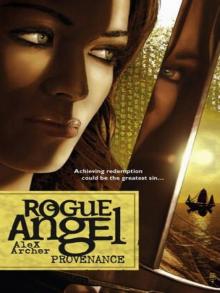 Provenance
Provenance Blood Cursed
Blood Cursed Fury's Goddess
Fury's Goddess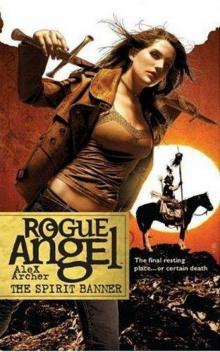 The Spirit Banner
The Spirit Banner Footprints
Footprints The Pretender's Gambit
The Pretender's Gambit Rogue Angel: The Lost Scrolls
Rogue Angel: The Lost Scrolls Staff of Judea
Staff of Judea Rogue Angel 55: Beneath Still Waters
Rogue Angel 55: Beneath Still Waters The Mortality Principle
The Mortality Principle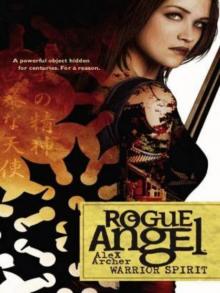 Warrior Spirit
Warrior Spirit Paradox
Paradox Tear of the Gods
Tear of the Gods Forbidden City
Forbidden City River of Nightmares (Rogue Angel)
River of Nightmares (Rogue Angel) Rogue Angel: The Secret of the Slaves
Rogue Angel: The Secret of the Slaves Destiny
Destiny Rogue Angel 51: The Pretender's Gambit
Rogue Angel 51: The Pretender's Gambit Celtic Fire
Celtic Fire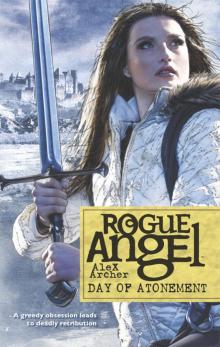 Rogue Angel 54: Day of Atonement
Rogue Angel 54: Day of Atonement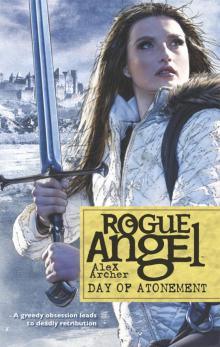 Day of Atonement
Day of Atonement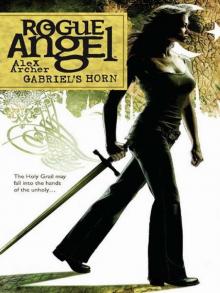 Rogue Angel: Gabriel's Horn
Rogue Angel: Gabriel's Horn Grendel's Curse
Grendel's Curse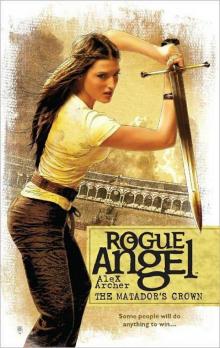 The Matador's Crown
The Matador's Crown Rogue Angel: The Chosen
Rogue Angel: The Chosen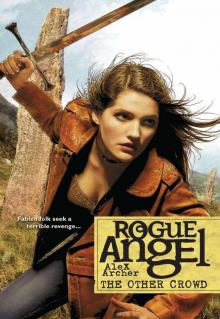 The Other Crowd
The Other Crowd Seeker’s Curse
Seeker’s Curse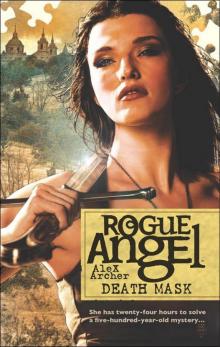 Rogue Angel 52: Death Mask
Rogue Angel 52: Death Mask The Golden Elephant
The Golden Elephant Blood Cursed (Rogue Angel)
Blood Cursed (Rogue Angel) Celtic Fire (Rogue Angel)
Celtic Fire (Rogue Angel)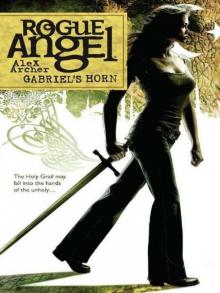 Gabriel's Horn
Gabriel's Horn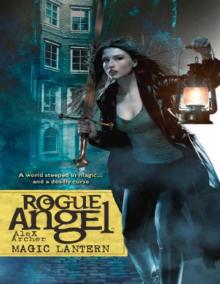 Magic Lantern (Rogue Angel)
Magic Lantern (Rogue Angel) God of Thunder
God of Thunder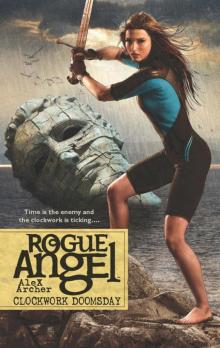 Clockwork Doomsday
Clockwork Doomsday The Bone Conjurer
The Bone Conjurer Treasure of Lima
Treasure of Lima The Soul Stealer
The Soul Stealer The Dragon’s Mark
The Dragon’s Mark Restless Soul
Restless Soul Rogue Angel: God Of Thunder
Rogue Angel: God Of Thunder Rogue Angel 49: The Devil's Chord
Rogue Angel 49: The Devil's Chord Death Mask
Death Mask Rogue Angel 46: Treasure of Lima
Rogue Angel 46: Treasure of Lima Swordsman's Legacy
Swordsman's Legacy The Oracle's Message
The Oracle's Message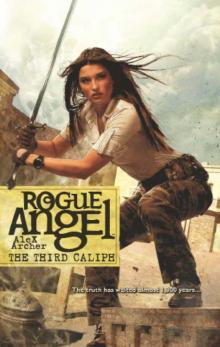 The Third Caliph
The Third Caliph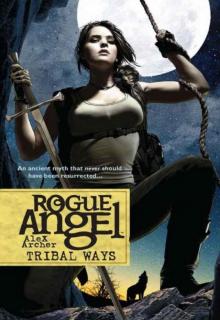 Tribal Ways
Tribal Ways Phantom Prospect
Phantom Prospect Rogue Angel 50: Celtic Fire
Rogue Angel 50: Celtic Fire Library of Gold
Library of Gold Rogue Angel 53: Bathed in Blood
Rogue Angel 53: Bathed in Blood Sacred Ground
Sacred Ground The Devil's Chord
The Devil's Chord Serpent's Kiss
Serpent's Kiss The Vanishing Tribe
The Vanishing Tribe Sunken Pyramid
Sunken Pyramid Sunken Pyramid (Rogue Angel)
Sunken Pyramid (Rogue Angel)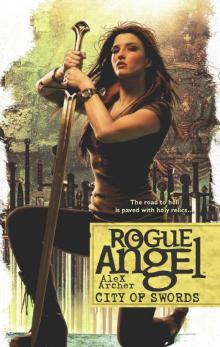 City of Swords
City of Swords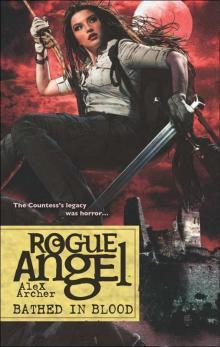 Bathed in Blood
Bathed in Blood The Lost Scrolls
The Lost Scrolls The Babel Codex
The Babel Codex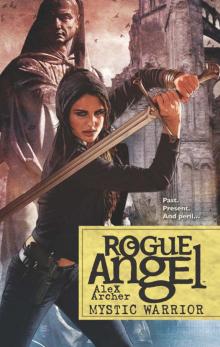 Mystic Warrior
Mystic Warrior Eternal Journey
Eternal Journey Beneath Still Waters
Beneath Still Waters Solomon's Jar
Solomon's Jar Beneath Still Waters (Rogue Angel Book 55)
Beneath Still Waters (Rogue Angel Book 55) Cradle of Solitude
Cradle of Solitude Secret of the Slaves
Secret of the Slaves River of Nightmares
River of Nightmares Polar Quest
Polar Quest False Horizon
False Horizon